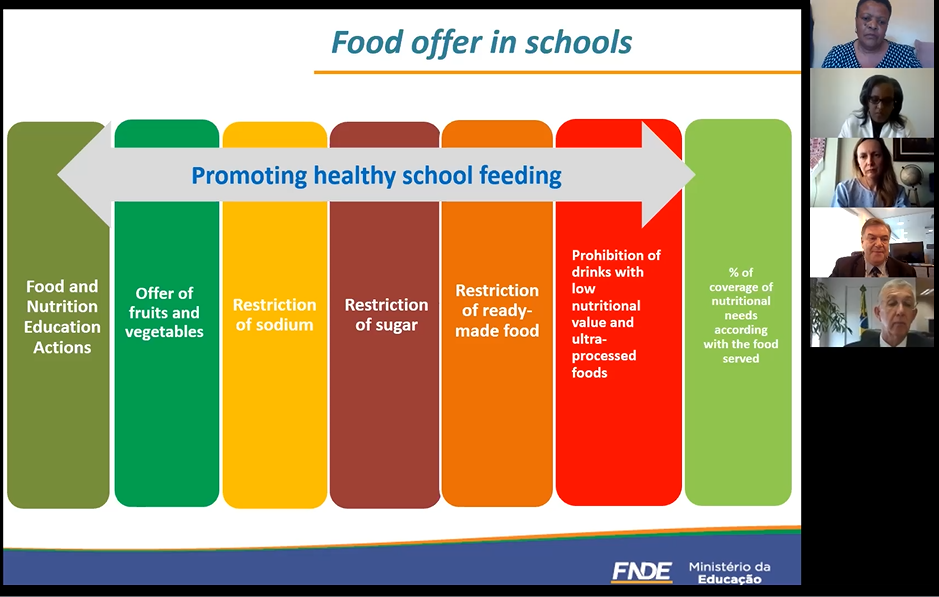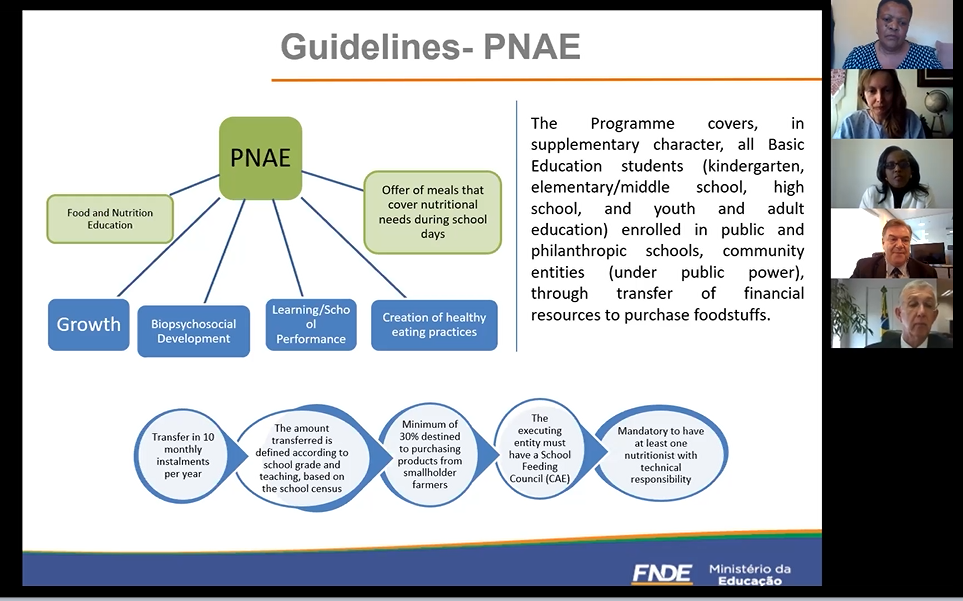
On Tuesday, September 21st, the WFP Centre of Excellence against Hunger Brazil welcomed a delegation from Lesotho as the first participants in the “Virtual Study Visit: Brazil”, a joint initiative with the Brazilian Cooperation Agency (ABC) and the National Fund for Education Development (FNDE) to showcase the successful Brazilian experience of its National School Feeding Programme (PNAE). The visit aims to virtually present the most relevant information shared in on-site visits to Brazil, supporting the work of the Brazil-WFP partnership in the global dissemination of the best practices in food and nutritional security, despite travel restrictions.
The opening workshop brought together 45 participants from the government and international entities from Lesotho, including the local WFP office, and representatives from FNDE, ABC, the Brazilian Embassy in Pretoria and the WFP Centre of Excellence. During the event, both governments provided an overview of their school feeding programmes, presenting their main features and challenges. In his opening speech, Ambassador Ruy Carlos Pereira, Director of ABC, highlighted the originality of the initiative. “The purpose of the experience is to provide a completely remote overview of the PNAE, continuing in a new format a series of in-person visits that have been carried out to Brazil since 2010. This tool, despite not replacing face-to-face interaction, it allows us to adapt to and resist in the context of this unprecedented pandemic”, said the ambassador.
Marcelo Ponte, President of FNDE, mentioned the importance of South-South cooperation in the creation of sustainable solutions for both sides of the exchange. “Brazil has already supported several African countries to build or improve actions in school feeding. Receiving these partnership requests for us is a sign of success, a sign that the program is very successful”, he said. From the Ministry of Education and Training of Lesotho, both Dira Khama, Principal Secretary of Basic Education, and Thuto Ntsekhe, Chief of Primary Education, emphasized the urgency of the issue. “Many aspects of our current school feeding scheme have their origins in the Brazilian strategies in food security and agriculture. We need to support each other, more than we have ever done before. In Lesotho and in many other African countries, malnutrition is on the rise”, stressed Dira Khama.

The WFP representatives Daniel Balaban, Director of the Centre of Excellence in Brazil, and Aurore Rusiga, Director of WFP Lesotho, recalled the importance of new and adaptive solutions to recover from the COVID-19 pandemic, which threaten global development gains achieved in the last few decades. “This virtual modality combines our best efforts and practices to provide quality assistance for everyone, everywhere at any time – showing we don’t need to be always in the same room to advocate and work for better school feeding programmes”, said Daniel Balaban.
Concluding the session, Ambassador Sérgio Danese, Chief of the Brazilian Embassy in Pretoria, recalled the long-standing relationship between the two countries. “Although different in size and history, Brazil and Lesotho have much in common as developing countries, with plenty of challenges that mark our social, economic and political fields. These are urgent issues we both face and around which we can and must cooperate “, he said.
The Virtual Study Visit methodology was built on the Brazilian experience acquired with the PNAE, which the WFP Centre of Excellence has been sharing with other countries over the last ten years, in partnership with FNDE and ABC. The opening workshop will be followed by a series of videos covering the most central topics of the PNAE, including the programme’s legal framework, financing, institutional capacity, design and implementation, as well as its components of community participation and purchases from smallholder farmers. The delegation is then invited again for a follow-up live virtual session, where participants can ask questions, exchange experiences and map out next steps in a final workshop.
Learn more about the “Virtual Study Visit: Brazil” and request a virtual visit here.




